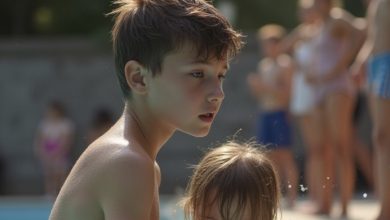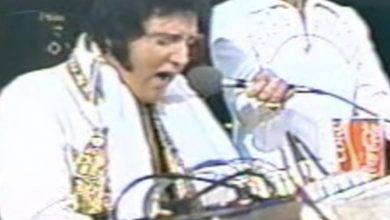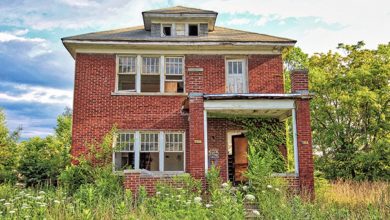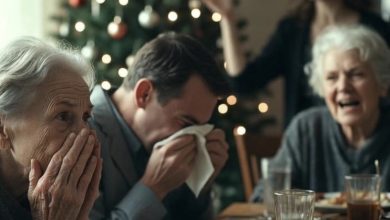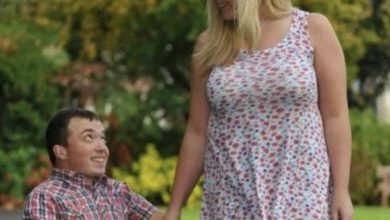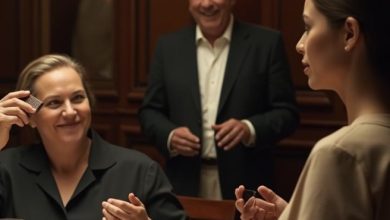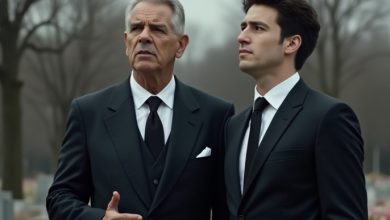On my 68th birthday I slept in a dusty garage and discovered my husband’s secret plan that changed our family forever
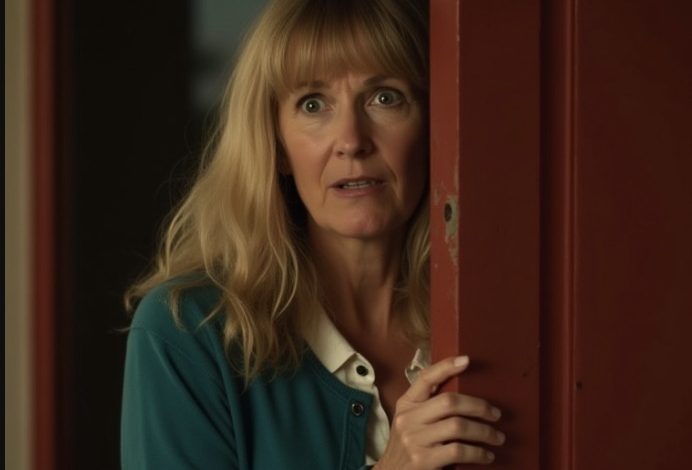
I never imagined spending my sixty-eighth birthday in a silent industrial yard, trying to fit a small brass key into a stiff old lock while the smell of hot asphalt and the distant rush of the freeway hung in the air. But that is exactly where I ended up—hands unsteady, breath short, and my son’s cruel words bouncing around in my head.
You’re just a useless old woman, Mom. What would you even do with a real inheritance? Dad knew that.
The metal finally scraped into place. With a stubborn click the padlock opened. I gripped the cold handle of the roll-up door with both hands and pulled. The door fought me the whole way, lifting inch by inch with a low groan. Dust poured down like gray snow. I tapped on my phone’s flashlight and sent a thin white beam into the dark.
I expected junk: dented cans, bent tools, piles of old tires, maybe a broken lawn chair. Instead, my light fell on three huge shapes lined up perfectly, each one covered with a fitted cloth. Steel shelves ran down the walls, not filled with greasy parts, but with labeled boxes and neat leather folders. And right at the front corner of the nearest cloth, a bright piece of chrome glinted back at me.
It looked like the shining front grille of a classic Aston Martin.
For a moment I thought I must be seeing things. Maybe my tired mind was turning shadows into movie props. But the longer I stared, the clearer it became. My fingers tightened around my suitcase handle. I took a breath, stepped over the threshold, and moved inside.
Before I explain what I found under those covers, I should tell you how the day started—in a law office high above downtown Los Angeles, where I sat in a borrowed black dress and listened to a stranger read my life in tidy paragraphs.
Mr. Hoffman’s conference room had dark wood walls and tall windows that looked out over the city. Sunlight flashed off glass towers. Cars slid along the freeway like silver threads. I sat at one side of the heavy table, twisting the thin gold ring I had worn for forty-two years. My son, Jonathan, sat next to me in a navy suit that fit him like it had been made for him, which it probably had. At fifty-two he looked like his father, Robert, had in his best years—straight shoulders, steady jaw—but there was a sharpness in his eyes that Robert never had.
Across from us, Mr. Hoffman cleared his throat.
“Before we begin,” he said politely, “please know that every line in this document is exactly what Mr. Campbell instructed.”
I should have paid more attention to that warning. But grief turns even strong minds heavy and slow.
The will was long. There were gifts to charities, a few small sums for old friends, detailed notes about company holdings. My attention drifted until Mr. Hoffman reached the part that mattered to us.
“To my son, Jonathan Campbell,” he read, “I leave our penthouse residence in Los Angeles and my primary investment portfolio.”
I felt Jonathan shift taller in his chair. He didn’t smile, but I could tell he wanted to. Then Mr. Hoffman went on.
“And to my beloved wife, Susan Campbell, I leave the property at 1420 Industrial Parkway—the garage and everything inside it.”
I waited for another sentence. Some explanation. Anything.
Nothing came.
“A garage?” I finally asked, my voice thin and small.
Mr. Hoffman’s face softened. “Yes. Your husband was very specific.”
He pushed a small envelope across the table. I heard a key rattle inside it.
I stared at the envelope, then at my son. Jonathan put a hand on my shoulder, gentle in a way that felt practiced.
“Don’t worry, Mom,” he said smoothly. “I’ll make sure you’re fine.”
Questions crowded my throat. Why would Robert give our home to Jonathan? Where was I supposed to live? What was this garage? But the weight of loss kept the questions from forming.
We signed papers. Mr. Hoffman repeated that everything matched Robert’s wishes exactly. As we left, he pressed the envelope with the key into my hand and looked like he wanted to say more.
“If you ever have questions,” he said quietly, “please call me.”
I nodded, not understanding why his voice sounded tight.
That evening, Jonathan drove us back to the penthouse. For fifteen years that corner unit on the fifteenth floor had been my world. I had chosen the rugs and the deep blue sofa, the dishes, the photo frames, the curtains that softened the light. Robert and I had watched a hundred sunsets from the balcony. But as soon as I walked in that day, I felt like a guest.
Jonathan set my suitcase by the door. “I think you should find somewhere else to stay,” he said.
I almost laughed, sure I’d misheard. “This is my home,” I said.
He gave a small smile that didn’t reach his eyes. “The penthouse is mine now, Mom. That’s in the will. I’ve got colleagues coming tomorrow to plan changes—turn Dad’s study into a real office. I need a clean start.”
“Where am I supposed to go?” I asked quietly.
He shrugged and looked around like a developer surveying a property. “You can stay with Aunt Helen. Or try the garage Dad left you.” He let out a short laugh. “Why he gave you that dump, I’ll never know. You going to open a repair shop at your age?”
The words hit me like a slap. I gripped the back of a chair to steady myself.
“Jonathan, your father and I built a life here,” I said. “You can’t just—”
“It’s not yours anymore,” he said flatly. “It’s mine. Dad made that clear.”
“I need a little time to figure things out,” I whispered. “At least a few days.”
He studied me for a moment. The last softness in his face slipped away.
“You’re just a useless old woman, Mom,” he said in a low voice. “What would you even do with a real inheritance? Dad knew that. The designers are here in the morning. I can’t have you in the way.”
Something inside me went very quiet. I didn’t argue. I picked up my suitcase, slid the envelope with the key into my purse, and walked out of the home where I thought I’d spend the rest of my life.
The doorman looked down as he held the door. Evening wind met me on the sidewalk. I got into my old Toyota, started the engine, and drove. For a while I just moved through streets I knew by heart, city lights blurring through tears. At a red light I typed the address from the plastic tag into the navigation app.
1420 Industrial Parkway.
The directions led me away from downtown into a part of the city I had never visited—low concrete buildings, tall chain-link fences, patchy streetlights. My headlights finally touched a faded number above a metal door. 1420.
I parked, pulled my suitcase from the trunk, and walked to the door. Which brings us back to the lock, the dust, the cloth covers, and the impossible shine of chrome.
Inside, I went to the first covered shape. My shoes squeaked on the clean floor. “Robert,” I whispered, fingers slipping under the fabric. “What did you do?”
I pulled the cover away and stared. An Aston Martin DB5 in silver birch stood there glowing like moonlight, perfect from every angle. Even my tiny flashlight scattered across its polished curves.
Robert had loved James Bond movies. He had never once said he wanted a car like this. Yet here it was.
I moved to the second car and lifted the cloth. A 1956 Mercedes-Benz 300SL Gullwing, deep ocean blue, chrome bright as jewelry. I knew about those doors. Everyone did.
The third cover hid a Ferrari 275 GTB/4 painted a dark wine red—the same color Robert always chose for our anniversary dinners. A small stand near the car held a plaque with notes about its history, auctions, and awards.
On the shelves, three leather binders were pressed in a neat row. I opened one. Inside were appraisals, service logs, photos, and certificates—numbers and names that made me dizzy.
These weren’t “nice old cars.” These were priceless.
That’s when I noticed an envelope taped to the wall next to a light switch. My name was written across it in Robert’s careful handwriting.
I pulled it down, flipped the switch, and the room brightened like a showroom. Clean white light poured from the ceiling. The floor was spotless and shiny. Vents hummed softly. Security cameras blinked in the corners. Cabinets lined one wall, closed and labeled.
I sat on a leather bench and opened the envelope.
My dearest Susan,
If you’re reading this, I’m gone, and you’re standing in the place I’ve kept secret all these years. I’m sorry for the shock. I owe you an explanation.
He told me that six years earlier, doctors warned him his heart was failing. He could have a handful of good years—maybe more, maybe less. He did not want me to carry that fear, so he told me only part of the truth. At the same time, he started planning for a future where I would be alone.
Then he wrote something that hurt and helped at the same time: that he had watched Jonathan change. Our boy had grown into a man who cared more about status than kindness, more about control than respect. Robert had heard the tone Jonathan used with me when he thought Robert wasn’t listening. He believed that if he left our wealth in a way Jonathan could manage it, Jonathan would quietly “guide” my choices until they were really his.
I couldn’t risk your safety on our son’s better nature, he wrote.
So he took a road I never would have guessed. He left Jonathan the glossy things—our address and the visible accounts—because he knew those would fill the space Jonathan wanted to show the world. Then he built a private safety net for me: the cars, and more.
These three cars alone, he explained, were worth around twelve million dollars. The binders held every paper I would need. He listed a contact named Marcus Weatherby who had helped him buy and care for the collection.
But the letter didn’t end with cars.
Behind the framed Venice photo, Robert wrote, there was a small safe. The combination was our wedding date. Inside I would find deeds, account numbers, and a complete list of assets placed in trusts for me—rental buildings, conservative investments, and enough steady income that I would never have to rely on anyone, not even our son.
If Jonathan showed me love and respect after Robert’s death, Robert wrote, I could choose to share something with him. If he didn’t, then this was my shield.
He ended the letter by saying that inheritances reveal character—what we are given and what we believe we deserve. Jonathan was being given a test. I was being given freedom.
I pressed the paper to my chest and let myself cry. The grief of losing Robert was still sharp, but now there was something else beneath it—a steady warmth. He had trusted me to handle this. He had seen what I had not wanted to see.
I found the Venice photo on the far wall. Behind it was a small safe. I typed our anniversary date. The door clicked open. Inside were neat folders and USB drives. The top document read:
Estate of Robert Campbell – Asset Inventory for Susan Campbell.
The list went on and on: apartment buildings in Seattle, a small commercial strip in Chicago, a vineyard up north, bonds and stocks with boring names and steady returns. Then a deed stopped me cold. A stone cottage in Carmel-by-the-Sea. Purchased four years earlier. Fully furnished.
I went to sleep that night on a small leather couch in the garage office. In the morning I showered in a compact bathroom stocked with new towels and simple toiletries. In a closet I found a few sets of clothes in my size. Robert had thought of everything.
I called the number from his letter. A calm British voice answered. “Mrs. Campbell? This is Marcus Weatherby. I was close to your husband. I’m very sorry for your loss.”
Two hours later he stepped into the garage, took a slow walk around the cars, and nodded.
“He chose well,” Marcus said. “Your husband only bought the best and kept everything correct. These are more than beautiful. They’re blue-chip assets. And storage, insurance, maintenance—he prepaid five years.”
He suggested an estates attorney and a financial adviser who had worked with Robert. “There’s no need to rush decisions,” he added kindly. “Grief and big choices don’t mix. Just know that you are secure.”
In the afternoon I drove back to the penthouse, not because I wanted to, but because I needed to say goodbye. Jonathan opened the door. The place already looked different—pictures gone, rugs rolled, a strange coldness in the rooms.
“I’ve boxed your personal things,” he said. “Designers come at nine-thirty.”
In the bedroom, boxes sat on my side of the bed. Another pile held Robert’s clothes and books. “I kept his Rolex and cuff links,” Jonathan said. “The rest is junk.”
I opened a box and touched Robert’s favorite sweater, the pen I gave him for his fortieth, a paperback with notes in the margin. Memories crowded my throat. I packed slowly. Jonathan paced.
“Can you hurry?” he said. “It’s just stuff. You don’t even have a place to put it.”
“I have a place,” I said. “And I’ll take the time I need.”
At the back of the closet I found Robert’s old leather messenger bag. Inside was another envelope addressed to me: a backup copy of everything in the garage safe. I tucked it into my purse.
Instead of returning to the garage, I drove to meet Attorney Patricia Winters, a calm, sharp woman who read Robert’s plans and nodded.
“Your husband was very careful,” she said. “What he set up is legal and solid. My advice: let us file the paperwork and keep you shielded. Take a little time. Go see this cottage.”
A week later I drove up the coast. The cottage in Carmel was small, warm, and quiet. The living room shelves held books I loved and ones I had said I wanted to read someday. The kitchen was tidy and ready. Off the bedroom was a tiny patio where I could see a sliver of the ocean. Above the desk in the study hung a watercolor of Venice—the painting we had once owned and lost, now replaced.
A neighbor knocked that first evening, a kind woman named Margaret who brought a casserole and stories about Robert visiting to argue over window angles and garden roses. “He wanted it just right for you,” she said.
In the desk I found a second note from Robert: If you are reading this, you made it. Use this place however you wish. I hope it gives you a fresh start.
For the first time since he died, I cried in a way that felt like healing.
Over the next weeks I built a new rhythm. Morning walks on the beach. Calls with Howard, the adviser, who explained income and expenses simply. “Your husband didn’t just build assets,” he said. “He built systems. You can manage as much or as little as you like.”
Once I took the Aston Martin out along the coast. The soft growl of the engine made me feel strangely close to Robert, like he was sitting beside me pointing out the shine on the water.
Jonathan called a few times. At first it was about papers. Then it turned into suspicion. “There are references in Dad’s notes to other investments,” he said. “People I’ve never met. Do you know anything about that?”
“Your father handled most finances,” I said. “Mr. Hoffman read the will.”
“That’s not an answer,” he snapped.
“It’s the answer you get,” I said, and ended the call.
He didn’t like being kept out. A month later I returned from the market and found his car by my fence. He looked around, taking in the cottage, the garden, the glint of water.
“Public records,” he said. “It took a while, but I found you. And I went to the garage. I saw those cars. A dealer friend told me what they might be. They’re worth more than the penthouse. You knew.”
“You threw me out and called me useless,” I said calmly. “I didn’t think sharing my plans with you was a good idea.”
He flinched. “Dad set me up,” he said bitterly. “He made me look like I got everything, then hid real money and gave it to you.”
“He was protecting me,” I said. “And trying to give you a chance to show who you are.”
He stared at me. “I can contest this,” he said finally. “A judge could see secret trusts as shady.”
“I’ve spoken with excellent lawyers,” I replied. “He did everything by the book. You could waste years and a fortune fighting a plan your father designed to survive exactly this, or you can decide who you want to be now.”
“This isn’t over,” he said, and slammed the door behind him.
Months passed. Then his assistant came to see me. Jonathan had spent too much on renovations. A deal failed. Loans were due. He was in trouble.
“He needs help,” she said.
“I’ll think about it,” I said.
The next day I drove to the penthouse. Walls were open, wires poking out, dust everywhere. Jonathan looked tired and smaller. He admitted he had gone too far. “I thought I could juggle it,” he said. “I always have.”
“I’ll help,” I said, “but with conditions. Come to Carmel. We’ll talk.”
On my patio the next morning, I laid it out: complete honesty about his finances, independent trustees to control any funds, a real budget, therapy with someone who understands money and family, and sincere amends for how he treated me.
“You want me on an allowance,” he muttered.
“I want you steady and alive,” I said. “No more showing off. No more gambling with your future.”
He asked for time, then called three days later. “I’ll do it,” he said.
The next months were hard work. Accountants cleaned up his books. The trustees set guardrails. The penthouse sold—less grand than he wanted, but enough to pay down a mountain of debt. He started therapy. At first he hated it. Then he began to see patterns in himself that even he didn’t like.
Our talks slowly changed tone. He asked how I was and actually listened. Sometimes we still argued. But something softer started to grow.
Almost a year after Robert died, Jonathan drove up to the cottage. He wore a simple shirt, no tie, no expensive polish. He looked human again.
“The sale closed,” he said. “The trustees say I’m stable. And… I took a job offer. Community development. Smaller pay. Real projects that help real people.”
I smiled. “Your father would have liked that.”
He gave me a small box. Inside were Robert’s cuff links and tie pins. “I thought these were my pieces of Dad,” he said. “They belong with you.”
Under the tray was a tiny pouch. My first wedding band rested inside—the thin gold ring that had lived on my hand for four decades. Jonathan handed me an envelope in Robert’s handwriting. The note inside said:
The first ring was a promise. This one celebrates the life we kept.
Tucked behind was a jeweler’s receipt for an eternity band he had ordered just before the hospital. Jonathan pulled out a velvet box and opened it. Diamonds and sapphires flashed back at me. I slid the band next to my old ring, and the two caught the sun like tiny stars.
“Thank you,” I whispered.
He cleared his throat. “What happened to the cars?” he asked.
“I’m keeping the Aston,” I said. “I like the way it sounds on the coast. The other two are being sold. Half the money will start a foundation to teach basic money skills to kids who never get invited to big tables. The rest goes into a trust for your future children, if there are any.”
He gave a surprised little laugh. “That’s… generous.”
“Your father believed in second chances,” I said. “So do I.”
He stood to leave, then paused at the gate. “Mom,” he said, eyes wet, “about that night at the penthouse—I’m sorry. I was angry and cruel. You didn’t deserve it.”
The apology didn’t erase the memory, but it softened it. “Thank you,” I said. “Keep doing the work. That’s how I’ll know you mean it.”
Later that day I drove the Aston along the cliffs. The Pacific stretched wide and bright. The wind smelled like salt and clean air. The new ring winked on my hand every time I turned the wheel.
“You were right,” I said out loud, thinking of Robert. “About Jonathan. About me.”
The brass garage key lay warm in the cup holder. Once, it felt like an insult—as if Robert had trusted our son and left me with a useless building. Now I knew better. That “useless” garage opened a door to freedom, safety, and a second life. It also held up a mirror to our son and gave him a chance to change.
When I parked back at the cottage, the sky was painted pink and orange. Inside, the hall clock chimed. The house smelled like lemon oil and fresh roses. My old gold ring sat next to the bright new band on my finger, and the simple key that started everything rested on the table by the door.
Whatever came next—Jonathan’s new work, the foundation’s first class, quiet mornings with tea, maybe noisy dinners one day with grandchildren—I would face it on my terms.
Not as a useless old woman.
As a woman her husband trusted, a mother whose son was finally learning, and a person who learned that the best inheritance isn’t a house or a car. It’s the courage to start again.

